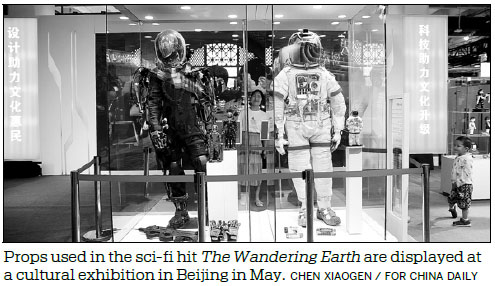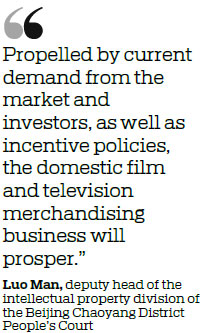Film and TV industry has much to learn on merchandising business
China is riding high in the film and television merchandise business but facing challenges, industry insiders said at a recent forum.
The fourth forum on online dispute resolution and movie merchandise development and protection was held in Beijing in July.
Film and television merchandising has seen rapid growth in the country. Among the successes, Monkey King: Hero is Back - an animation hit loosely adapted from the 16th century novel Journey to the West - earned more than 10 million yuan ($1.42 million) on the first day of its derivatives' sales in 2015.
Another animated fantasy Big Fish & Begonia sold merchandise worth more than 50 million yuan in 2016. In 2017, the fantasy romance movie Once Upon a Time, starring high-profile actors, saw its merchandise sales surpass 300 million yuan.

Chinese animated cartoon brand Boonie Bears, which has spawned TV shows and films, sold merchandise worth 2.5 billion yuan by May 2018.
According to an expert, the merchandise of global sci-fi hit The Wandering Earth has an 8 billion yuan market.
Yet China's emerging merchandise business has yet to fill in some gaps when compared with their mature foreign counterparts, experts said.
"Research showed that in Europe, the United States and Japan, movie-based products account for as much as 70 percent of total film revenue, with the other 30 percent coming from box office grosses," Lang Guimei, a judge of the Supreme People's Court, said at the forum.
"But in China, most revenue still comes from the box office and the proportion generated by merchandises is low," Lang noted.
The judge added that Hollywood movie-based toys earned $5.7 billion in 2016, equivalent to 85 percent of China's total box office revenue in 2015.
Disney has made a pretty penny from its 2013 hit Frozen - it sold 3 million Elsa and Anna role-play dresses in North America, which helped it earn $4.5 billion, exceeding the amount garnered from domestic box office.

This year, the international sales of Lion King merchandises totaled 8 billion yuan.
The development of the domestic merchandising business is constrained by copyright piracy, said She Yinbin, editor-in-chief of the children's channel at the Tencent video animation center.
She cited the cartoon series Super BOOMi as an example. After it was broadcast on Tencent Video and other platforms, pirated merchandise, including toys, phone cases and T-shirts, appeared on e-commerce platforms. So far, Tencent Video has tackled 282 kinds of pirated goods.
"Aside from copyright infringement, there are many other problems to solve, including a short life cycle of merchandise and a shortage of professionals," said Yan Bo, deputy director of IP and legal affairs office at State broadcaster China Central Television.
Yan added that though The Wandering Earth has performed well at the box office, its merchandise sales have lagged. This is because filmmakers didn't consider merchandising until the movie was screened. Merchandising design should have been done before or simultaneously with the film's release, she said.
"Propelled by current demand from the market and investors, as well as incentive policies, the domestic film and television merchandise business will prosper," said Luo Man, deputy head of the intellectual property division of the Beijing Chaoyang District People's Court. She added that the Ministry of Finance also encourages the market expansion of films' derivatives and provides a policy guarantee for the industry.
yinruowei@chinadaily.com.cn
(China Daily 08/08/2019 page17)














